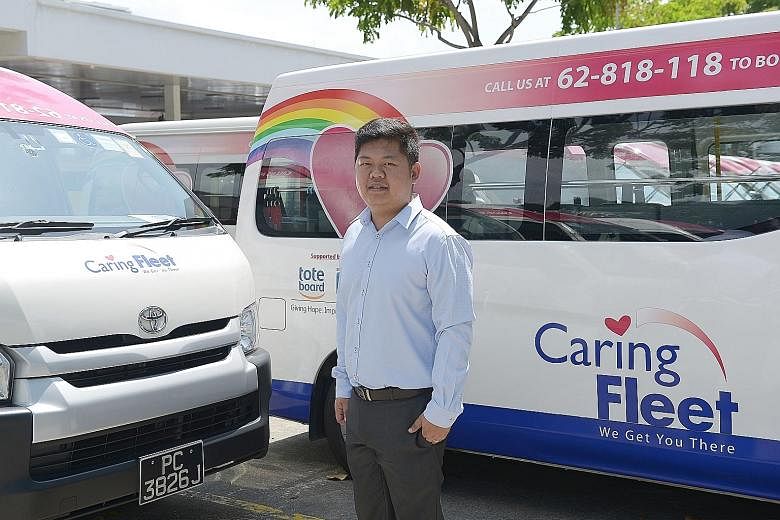Q How did Caring Fleet Services (CFS) start?
A CFS was founded as a non-profit social enterprise in 2010, with a mission to provide dedicated and specialised transportation services for wheelchair users and people with mobility difficulties.
Previously, such mobility vehicles were not readily available to the public. Mobility assistive services were present, but they were very fragmented. CFS was set up to centralise such transport services.
We desire to give people with limited mobility greater freedom and convenience in travelling.
We encourage independence and self-sufficiency among the physically challenged.
We also want to provide help for the financially disadvantaged. Our services are subsidised for lower-income clients.
The Singapore Centre for Social Enterprise (raiSE), an umbrella body that develops local social enterprises, started to fund CFS last month. raiSE also mentors CFS through advisory services and training programmes.
Q What services do you offer?
A CFS provides accessible transportation for people with mobility difficulties. Our services are used for many purposes, be it to go for medical and rehabilitation appointments, social activities, weekend outings, school or work.
We cater mainly to lower-income individuals and voluntary welfare organisations (VWOs), including daycare centres and eldercare centres. Twenty-two out of 24 of our vehicles serve VWOs. We serve beneficiaries at VWOs on a contract basis.
Our remaining two vehicles are used for "on-demand" services.
It is open to the public who need wheelchair-friendly transport.
This makes it easy for individuals who require our services on an ad hoc basis. The service is charged based on a one-way trip. It covers the cost for a wheelchair user and a caregiver.
Our vehicles are minibuses equipped with wheelchair lifts and safety-restraint systems. Every vehicle has an auto-sliding access door and a high roof, with ample headroom for wheelchair users.
This gives clients maximum comfort when boarding and travelling.
Q How far has CFS come since starting its operations?
A Initially, it was difficult to sustain operations. We started off with only three vehicles in 2011.
CFS was hardly known to eldercare centres or hospitals so we were disadvantaged in terms of economy of scale.
Our beneficiaries were often unable to pay for our services fully, affecting our cost recovery.
Our operations became smoother after several organisations tried our service, realised the quality we were providing and recommended us to other organisations.
We ensure our customer service officers are well-trained to assist passengers safely into and out of the vehicles.
We train them to communicate empathetically with clients, who may be short-tempered or suffer from conditions like dementia.
We usually deploy the same customer service officer to the same passengers, which allows our clients to feel more comfortable with the officer each time they travel.
We usually hire senior citizens as our customer service officers, as we believe they can better connect with our clients, many of whom are elderly people.
Many of our senior officers can speak dialects, allowing them to communicate effectively with our elderly clients.
Taking care of our clients' needs holistically underpins the client-centric services we provide.
Hiring seniors is also in line with our mission to provide employment to senior citizens.
We have since expanded to the current fleet size of 24 vehicles and 27 customer service officers. We also have six operational staff.
Q What is it like being a social enterprise in Singapore?
A It is always a challenge for social enterprises to maintain a sustainable business model.
A career in the social service sector is not very favoured by Singaporeans in general. There is a common belief that a job in the social service sector is low-paying or a form of volunteer service.
Based on Singapore's demographic trend, there will most probably be an increase in demand for transport services like ours.
With a lack of transport services catering to the needy in Singapore, this is where CFS fills the gap in the social service sector.
Q What are the next steps for growth?
A We intend to extend our services to more affluent individuals and working professionals.
They may have sustained temporary injuries and are wheelchair- bound for the short term.
They will pay the full amount for our services, helping us keep the fees for the lower-income individuals low. We intend to further decrease prices for this underprivileged group.
A single trip costs $40 unsubsidised.
We also plan to improve our on-demand booking service, such that a vehicle will be available within a few hours, as compared with the current waiting time of one to three days.
We are collaborating with on-demand transport service providers in creating mobile booking applications.
Digital platforms make the booking process more user-friendly and enhance outreach.
We are also exploring the option of carpooling services for on-demand booking to allow clients to share rides, making it more cost-saving for our operations.
We aim to increase to 30 vehicles and up to 34 drivers by next year.

